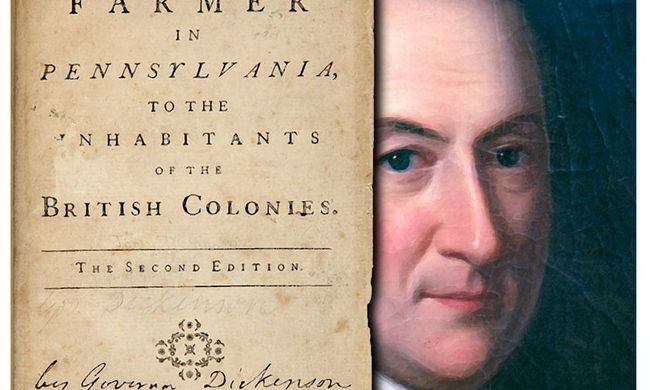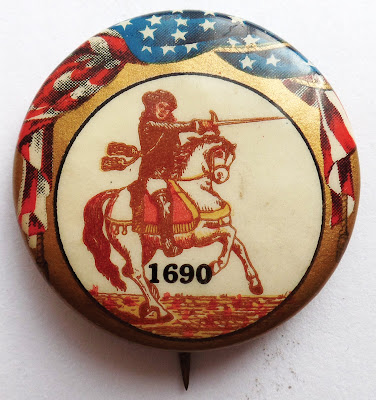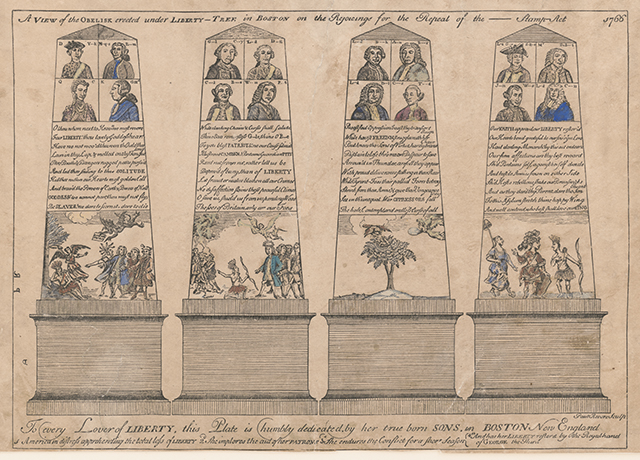'... All drafts also included one form or another of the proposition "that his Majesty’s Liege Subjects in these Colonies, are entitled to all the inherent Rights and Liberties of his Natural born Subjects, within the Kingdom of Great Britain.” The resolves of the Congress on the relationship between the colonies and the King were clear and unequivocal. The Stamp Act Congress fully recognised and declared its allegiance to the King in his executive capacities and as personal symbol of the union of colonies and home country. ...'
- from John Dickinson and the Revolution in Pennsylvania, 1764-1776 (published 1965)
John Dickinson (pictured above, 1732-1808; Wikipedia here) was a pupil of renowned Donegal-born Presbyterian Francis Alison, and also of William Killen, who had been 'born in North Ireland in 1722, of Scotch Presbyterian heritage' and who went on to become the first Chief Justice of the first US Supreme Court in 1776.
A very wealthy man, Dickinson became one of the signers of the US Constitution. In 1767-8 he wrote a series of anonymous articles entitled Letters from a Farmer in Pennsylvania (Wikipedia here) explaining how various laws were unconstitutional and how Americans should resist them. French philosopher Voltaire was so impressed that he compared Dickinson with the orator statesman of Rome, Cicero. The Letters were a sensation and outside of America they were also printed in Dublin, London and France. In their day they were more popular and influential than even Thomas Paine's writings. (Paine was a relatively late arrival to the party, only landing in Philadelphia on 30 November 1774, and his Common Sense being published on 10 January 1776).
Perhaps Alison and Killen had seeded a chronology of earlier liberty in Dickinson's mind. Perhaps their parents had handed down memories to them both. Dickinson's biographer pointed out that the first of the Letters from a Farmer was penned on "the date of the fifth of November, 1767, the seventy-ninth anniversary of the day on which the landing of William the Third at Torbay gave constitutional liberty to all Englishmen" (online here).
The Sons of Liberty gathered at the Greyhound Tavern in Roxbury, Massachusetts on Monday 15 August 1768 and among their 45 toasts was one "To the immortal Memory of that Hero of Heroes William the Third". And Dickinson's sixth letter included this reference – "It is sufficient to remind the reader of the day on which King William landed at Torbay".
.................
With the 4th July having recently come round again, I had a couple of opportunities to speak briefly on the general topic, from an Ulster-Scots perspective. In our era and context we often get bogged down in two competing concepts of nationality, and consequently many here try to retro-fit those present day concepts upon the past. Which causes all kinds of bafflement. "Why did Ulstermen try to end British rule in America? Are you all not meant to be loyal?" and so on.
For our forefathers, nationality was not an end in itself, but was a mechanism for liberty. In pre-Revolutionary America, rather than being anti-British, in terms of rights and liberties the colonists demanded to be fully British – as the quote above says "that his Majesty’s Liege Subjects in these Colonies, are entitled to all the inherent Rights and Liberties of his Natural born Subjects, within the Kingdom of Great Britain.”
Of course, those appeals fell on deaf ears in London, and in late 1775 & 1776, Independence became the only remaining route to liberty.
.................
Here is a famous illustration done by Paul Revere in 1766, depicting a celebratory obelisk which locals created and installed under the Liberty Tree in Boston, after King George III had withdrawn the despised 'Stamp Act' law. Revere entitled the illustration "A view of the obelisk erected under liberty tree in Boston on the Rejoicings for the Repeal of the —— Stamp Act 1766 ... To every Lover of Liberty this Plate is humbly dedicated by her true born Sons in Boston, New England." A full description is online here. Portraits and poetry, it was quite a statement:
The fourth panel says –
“And has her Liberty restored by the Royal hand of George the Third;”
Even the Ulster Solemn League and Covenant of 1912 echoes with the very same ideas - Thomas Sinclair's words were that a 'Home Rule' parliament in Ireland would be '... subversive of our civil and religious freedom, destructive of our citizenship ... to stand by one another in defending, for ourselves and our children, our cherished position of equal citizenship in the United Kingdom'.
The nationality that each individual chooses is of course up to that individual. In Northern Ireland we have a duality of options, and I know quite a few people of other nationalities who live here. But would anyone choose a nationality which restricts their liberty?
There are many dimensions to nationality – such as a sense of continuity, of endurance, of tradition, of quelling internal differences to achieve something greater. But power corrupts. Nations can exploit their own populations, silence dissenters and exploit minorities. And absolute power corrupts absolutely. These are the pitfalls of human nature.
Nationality should not be an end it itself – it should be a mechanism to protect and ensure liberty of all of its people. When liberty is threatened, nationality can be jettisoned. This is why liberty comes before loyalty.
.................
• More info on Dickinson and his Letters from a Farmer here, on Libertarianism.org
• Also worth looking at is James Otis Jr's 1764 tract The Rights of British Colonies Asserted and Proved , printed in Boston, in which he refers back to the 1688 Revolution for precedent (online here / further article online here)
On William of Orange: "... we should have heard nothing of the oppressions and misfortunes of the Charles’s and James’s; The revolution would never have taken place; the genius of William the third would have languished in the fens of Holland, or evaporated in the plains of Flanders ... Great-Britain to this day might have been in chains and darkness ..."
On slavery: "The Colonists are by the law of nature free born, as indeed all men are, white or black … It is a clear truth, that those who every day barter away other mens liberty will soon care little for their own… That the colonists, black and white, born here, are free born British subjects, and entitled to all the essential civil rights of such, is a truth not only manifest from the provincial charters, from the principles of the common law, and acts of parliament; but from the British constitution, which was reestablished at the revolution, with a professed design to lecture the liberties of all the subjects to all generations."




0 comments:
Post a Comment